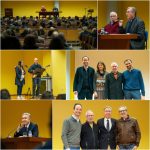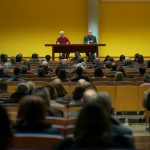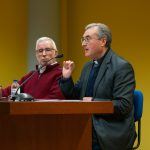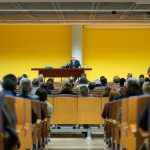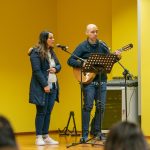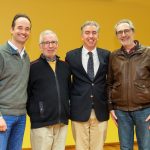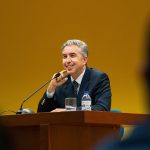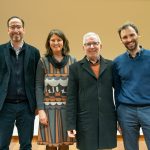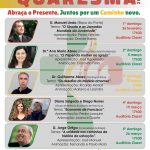Under the motto ‘Embrace the present. Together for a new way’, the Lenten Conferences, now in their 14th edition, are being held at the Sanctuary of the Heart of Mary (Carvalhos, Pedroso, Vila Nova de Gaia, Portugal). So far, 3 of the 5 conferences planned for this period have been held:
1st Conference: Synod and World Youth Day. By D. Manuel Linda, Bishop of the Diocese of Porto.
The Lenten Conferences opened their 14th edition on 26 February 2023, with a lecture by D. Manuel Linda, Bishop of the Diocese of Porto, before an audience of more than 200 people. The session began with a beautiful song performed by Davide Barros. Then, after a brief introduction of the speaker by José Manuel Cruz, D. Manuel Linda began his speech.
The first part of the talk focused on the synodal path that the Church has travelled. After a brief historical review of the revitalisation of the Synods brought about by the Second Vatican Council and continued by successive popes, Mons. Manuel Linda highlighted the role of Pope Francis in extending participation in the Synod to all the people of the Church and not only to the synodal assembly and certain experts. He went on to point out that this elevates the idea of the “People of God”, as we are all called to the edification and renewal of the Church. He also explained that “synodality” expresses the nature of the Church – the Church is the People of God – a people walking together, gathered in an assembly called together by Jesus and in the power of the Holy Spirit to proclaim the Gospel.
Continuing his reflection on World Youth Days, Mgr Manuel Linda began by explaining that Pope John Paul II realised that young people are “mission land” and that, to involve them, the Church would have to be festive and joyful, so, in 1985, he promoted the creation of the first World Youth Days. Today, after so many editions, in which more than a million young people have participated in each one of them, it is recognised that the Days have changed the face of the Church, that it is much more joyful and attractive than before, and that they nourish its reforming character. The whole of society has been somewhat shaken by the realisation that young people continue to connect with the Church and to seek Jesus Christ in it, guided by a great empathy with the Pope. Mr. Manuel Linda ended his speech by expressing the hope that salvation will reach the many thousands of young people who will participate in the World Youth Days.
At the end of the talk, Davide Barros sang another song and, finally, Father Marçal Pereira, promoter of the Lenten Days, thanked the guest, the collaborators and all the public who had massively supported this event.
2nd Conference: The role of women in the Church. By Dr. Ana Maria Abreu
The second Lenten conference took place on 5 March. The heavy rain that was felt that afternoon was not enough to discourage the presence of about 100 people to listen to the lecture of Dr. Ana Maria Abreu on the theme “The role of women in the Church”.
As usual, the lecture began with a musical moment by Cristóvão Faria, whose beautiful voice immediately focused the audience on the spirit of the event. This was followed by the presentation of the speaker by José Figueiredo, who began by congratulating Father Marçal, the promoter of the lecture series, on his eightieth anniversary. He continued with the framing of the theme and made a brief presentation of the speaker’s curriculum vitae, highlighting her role as director of human resources in an institution for the elderly.
Dr. Ana Maria Abreu began her intervention with a question: “What does it mean to be a woman?”, indicating that before thinking about the role of women in the Church, it is important to understand what it means to be a woman. She recalled that the Bible identifies two models of woman, in two women conceived without original sin: Eve and Mary, the mother of Jesus.
The book of Genesis relates that Eve did not trustingly surrender to the plan that God presented to her, because she wanted to have a leading role, allowing herself to be seduced by the temptation to have all the knowledge and ending up breaking her relationship with God. She was not able to accept something that was forbidden to her and that would perhaps be revealed to her at the right time. Mary, on the other hand, confidently surrendered to God’s plan, despite having a much more radical and daring challenge than Eve, for to be an unwed mother in the Jewish society of the time was to risk death, as well as widespread misunderstanding. Mary was also curious to know – “What will this be like? -, but she accepted a role of complementarity with St Joseph, confidently submitting to the many setbacks that arose. This does not mean – the speaker pointed out – that Mary was not capable of initiative and action, as the episodes of the loss and finding of Jesus in the Temple and the Wedding at Cana show.
Dr. Ana Maria Abreu pointed out that she was not advocating that women should assume a mimicry with men, but that, on the contrary, they should preserve and value their differences, which would not be contradictory to the struggle for equality with men in terms of dignity and rights.
Dr. Ana Maria Abreu went on to point out some characteristics that are generally more evident in women (having explained that this does not mean that men do not also have them to some extent) and which, in her opinion, women (and society in general) should value rather than belittle due to social pressure to imitate the male model.
The speaker shared that in preparing the lecture she kept in mind her reference to the period of Lent, which led her to reflect on the role of women at the time of Christ’s Passion, noting that there were no women present at the Transfiguration of the Lord and that despite this, at the moment of greatest discouragement, they did not flee (like men), they did not deny, but remained with Him until the end, because of the great loving zeal they nourished in Him. This led her to agree with Pope Francis when he says that this is why women were the first to receive the Good News of the Resurrection.
In the final part of her intervention, Dr. Ana Maria Abreu Ana Maria Abreu recalled some holy women who have marked the Church and humanity.
At the end of the conference, Cristóvão Faria sang a beautiful Marian song and Father Marçal greeted those present, thanked the collaborators in the organisation of the conference and expressed his appreciation for the presence and communication of the speaker.
3rd Conference: The Challenges of the Mystery of Love. By Dr. Guilherme Abreu
On March 12, 2023, on an afternoon that already heralded spring, more than one hundred people gathered in the Claret Auditorium of the Heart of Mary Sanctuary, in Carvalhos, to attend the third Lenten Conference, which had as speaker the clinical psychologist Dr. Guilherme Abreu, who presented a reflection on the theme “The Challenges of the Mystery of Love”.
As usual, the session began with a song, this time sung and performed by the couple Mariana and Leandro, whose refrain was related to the theme of the session: “I can go far beyond where I am, putting on the wings of the Lord…”.
This was followed by the presentation of the speaker by Dr. Ricardo Matias, who, after a brief summary of the speaker’s curriculum vitae, gave him the floor.
Dr. Guilherme Abreu began by referring to the etymology of the words that make up the expression “amorous mystery”, since in Greek the word “mystery” is associated with the meaning of “secret ceremony” and the word “amorous” has a good translation in the expression of Luís de Camões: “fire that burns without being seen”. Both are united in the idea of the invisible, the hidden, that which cannot be seen, that which cannot be reached directly. This idea marked the guiding thread of the whole communication. From it he recalled the reading heard in the Ash Wednesday liturgy, in which Jesus advises to pray in the intimacy of the secret place, and referred to the book of Pope Benedict XVI (written before his papal investiture) – “Introduction to Christianity” – which refers to the “material gravity” of people, i.e. the human tendency to focus on the tangible, which must be overcome by faith if we want to penetrate the mystery.
Dr Guilherme Abreu warned that his words should not be interpreted as if the visible were not important, and in this sense he recalled what is written in the Book of Genesis when God ends the creation of the world: “God saw that it was good” (Gen 1:21). Jesus himself was not only a spiritual being, but Man and God, so the visible form is also important. For the speaker, faith is the bridge that unites the visible and the invisible, the concrete and the mystery, contradicting the Manichean view that put the emphasis on the spirit, despising the body. Quoting the writer Gilbert Keith Chesterton, the speaker stressed that “there is a real bridge between the spirit and reality” and that, in his view, that bridge is faith. Therefore, he believes that it is the Christian’s duty to give soul to reality through faith.
The speaker also explained that God does not take us into the mystery to harm us, but because he wants us to join him, to integrate ourselves into the very dynamic of the mystery, humbly trusting (“happy are those who believe without having seen”). In other words, those who believe without seeing are already integrating the mystery, they are approaching the divine reality.
The speaker then referred to the characteristics of the mystery of God, stressing that the letters of St. John reveal the density of this mystery by introducing a new idea of the Divine, a God who is Love and who, being God, is not an invisible abstraction, since being connected to Him implies at the same time being connected to the other. At this point, the speaker summed it up in five points to indicate the essential challenges of the mystery of love.
The talk concluded with Mariana and Leandro singing a second song, which in a way prolonged Dr. Guilherme de Abreu’s lecture: “As you wish, where you wish, when you wish, without hesitation, without fearing anything, be available, as your son…”.
Finally, Father Marçal Pereira made the final farewell, thanking the speaker, the organising team and those present and inviting them to the next conference.
Information provided by José Manuel Cruz
- Bispo Manuel Linda
- Bispo Manuel Linda
- Dr. Guilherme Abreu
- Dr. Guilherme Abreu
- Dr. Guilherme Abreu
- Dr. Guilherme Abreu
- Dra. Ana María Abreu
- Cartel





